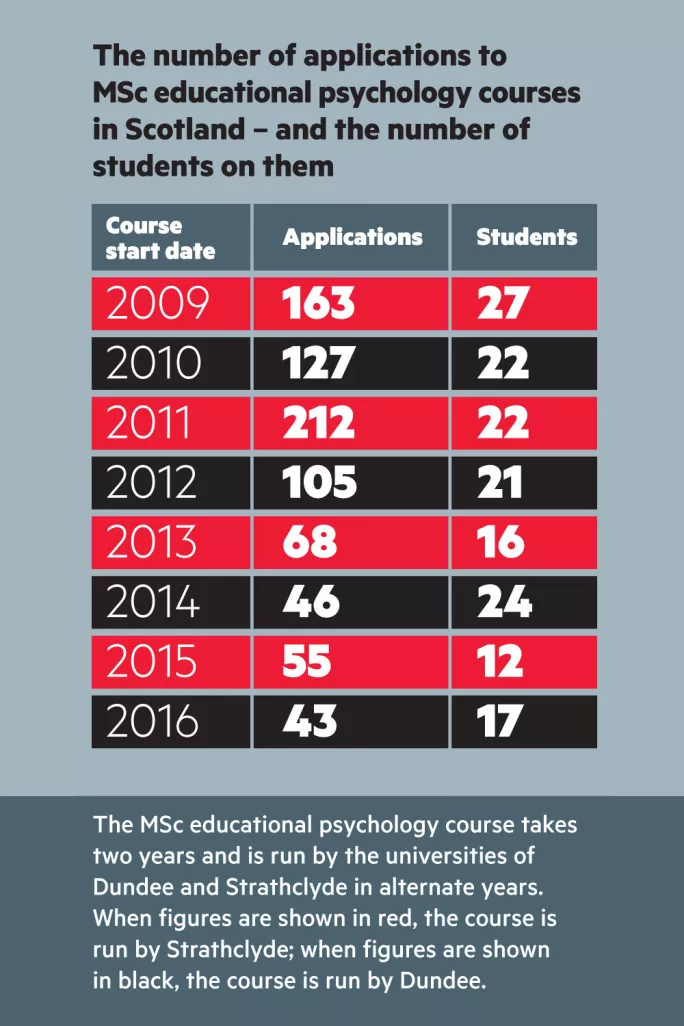Shortage of psychologists sparks national shake-up

The education psychology service may be removed from local council control and turned into a national service, TESS can reveal.
The proposal has been put forward amid fears that training courses could fold because of a lack of demand, exacerbating an already desperate situation for schools seeking psychological support for students.
Applications to study educational psychology have plummeted since the Scottish government scrapped a bursary of £49,000 - paid over two years - in 2012 (see table, below). Scotland’s two training courses for educational psychologists are now in danger of closing unless action is taken to increase student numbers, according to Barry Syme, the chair of the Association of Scottish Principal Educational Psychologists (ASPEP).
Next year, just 12 newly qualified educational psychologists are expected to join the profession in Scotland - around half the number needed annually to fill vacancies. The following year it is expected that just 17 educational psychologists will graduate.

‘Massive issue’
Councils are already reporting that they are struggling to fill educational psychology posts (see box, “Desperate measures for councils”, below) and headteachers have hit out at cuts to educational psychology services.
Ann McIntosh, a past president of primary headteachers’ organisation AHDS, and head of a Glasgow primary, said educational psychology had changed “unbelievably” over the past five years at a time when children and parents’ mental health was a “massive” issue for schools. She said the service was no longer “practical, supportive and on the ground”.
“Only very, very rarely do educational psychologists now work one-on-one with children, which headteachers find unhelpful and frustrating because they are still involved in making decisions about our most vulnerable children but they don’t necessarily work with them or know them,” she said.
TESS can reveal that a group comprising Education Scotland, education directors and educational psychologists is investigating whether educational psychology should be removed from council control and instead run as a national service.
The group is due to discuss its findings with Scottish government officials next week.
‘Unequal’ access
Those within the profession argue that a move to a national service could improve equity of access: currently educational psychology staffing ratios vary widely from one council to the next, with some educational psychology services involved in direct therapeutic work, while others are consultative only.
TESS understands that education secretary John Swinney’s recently announced review of school governance is being seen as the perfect vehicle for a shake-up.
Three other working groups, charged with looking at the issues around training (see box, “A meeting of minds”, below), will report their findings to the National Scottish Steering Group for Educational Psychology on Tuesday.
‘The service is no longer practical, supportive and on the ground’
Mr Syme said that the groups’ recommendations must result in action.
“I’m more optimistic now about the future than I have been for a long time because we are having these discussions with the Scottish government and Education Scotland. But there has to be an outcome,” he said.
“We need 20-25 educational psychologists coming out each year to fill the gap - just for people retiring or moving on. But we need more because, with a predominately female workforce, we have a lot of part-time workers and so we have to have more bodies.”
Applications for the two-year MSc educational psychology courses - run by the universities of Dundee and Strathclyde in alternate years - have slumped since the bursary was scrapped in 2012.
Scotland is also losing a small number of educational psychology students to England, said Beth Hannah, course director at the University of Dundee. In England, students qualify with a doctorate instead of a masters, have their fees of up to £29,000 covered and are given a bursary for living costs.
A Scottish government spokesperson said: “It is for each local authority to take decisions around the number of educational psychologists that it employs.
“We are working with the National Scottish Steering Group for Educational Psychologists, which includes representatives from the profession and universities, to ensure a sustainable supply of educational psychologists to meet potential future needs. This includes work to improve the data available to inform future workforce planning decisions and to explore how training provision can continue to meet future needs.”
You need a Tes subscription to read this article
Subscribe now to read this article and get other subscriber-only content:
- Unlimited access to all Tes magazine content
- Exclusive subscriber-only stories
- Award-winning email newsletters
Already a subscriber? Log in
You need a subscription to read this article
Subscribe now to read this article and get other subscriber-only content, including:
- Unlimited access to all Tes magazine content
- Exclusive subscriber-only stories
- Award-winning email newsletters